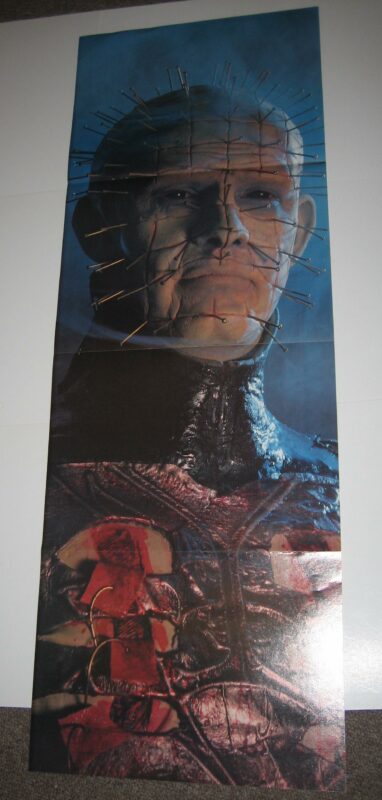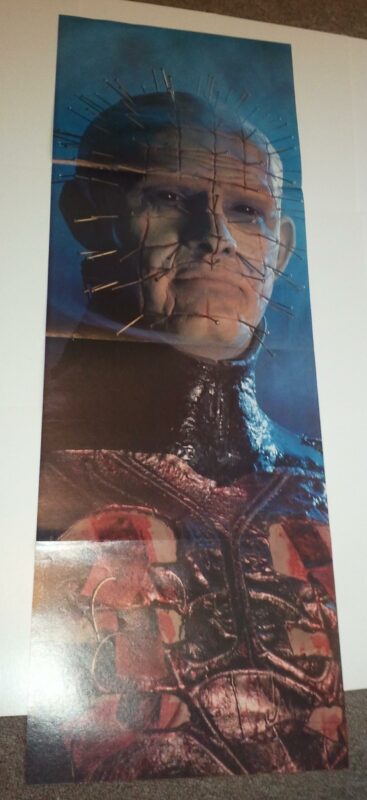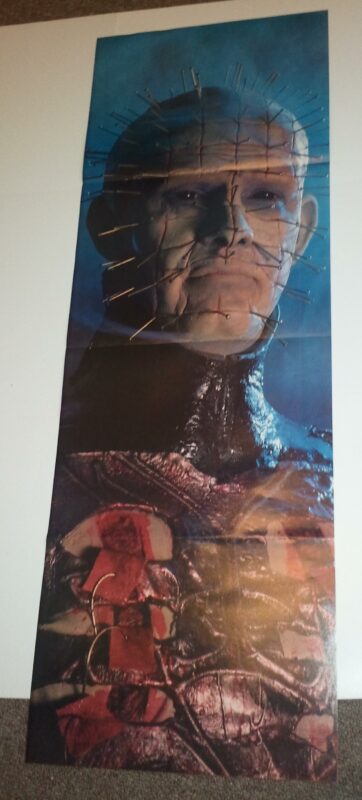Hellraiser Poster # 7 Pinhead Doug Bradley Clive Barker Horror HULU Hellseeker
$69.99
Description
Hellraiser (also known as Clive Barker’s Hellraiser) is a 1987 British horror film written and directed by Clive Barker, based upon his own novella The Hellbound Heart. The film spawned a series of sequels and was Barker’s first feature film. On October 24, 2013, Clive Barker posted on his official Facebook page that he would be personally writing the remake of the original “Hellraiser” and that he had already completed a deal with Dimension Film’s Bob Weinstein. He also stated that he will be pushing for practical effects rather than CGI and the original Cenobite actor Doug Bradley would be returning as Pinhead. Here is his official post: “HOT FROM HELL! My friends,I have some news which may be of interest to you. A few weeks ago I had a very productive meeting with Bob Weinstein of Dimension Pictures,in the course of which I pitched a remake of the first HELLRAISER film. The idea of my coming back to the original film and telling the story with a fresh intensity – honoring the structure and the designs from the first incarnation but hopefully creating an even darker and richer film – was attractive to Dimension. Today I have officially been invited to write the script based upon that pitch. What can I tell you about it? Well, it will not be a film awash with CGI. I remain as passionate about the power of practical make-up effects as I was when I wrote and directed the first HELLRAISER. Of course the best make-up in the world loses force if not inhabited by a first-rate actor. I told the Dimension team that in my opinion there could never be a Pinhead without Doug Bradley, and much to my delight Bob Weinstein agreed. So once the papers are signed, I will open a Lemarchand Configuration, dip my quill in its contents and start writing. I promise that there will be nowhere on the Internet where the news of my progress will be more reliable than here, because the only author of these reports will be Your Infernal Corespondent, me. My very best wishes to you all,my friends. Clive.” The Hellraiser franchise was adapted to comic book form in the late 1980s and early 1990s.
Pinhead is a fictional character from the Hellraiser series, mostly serving as the main antagonist. Pinhead is the leader of the Cenobites, formerly human creatures from an extradimensional realm who travel to Earth through the Lament Configuration and harvest human souls. Depicted as intelligent and articulate, the character was deliberately presented as a departure from the mute or wise-cracking 1980s horror movie villains who preceded him, being based more on Count Dracula. Pinhead first appears in Clive Barker’s novella The Hellbound Heart (1986), in which he only appears in the story’s beginning, and is portrayed as a sexually ambiguous follower of the “Engineer”: ‘Its voice, unlike that of its companion, was light and breathy-the voice of an excited girl. Every inch of its head had been tattooed with an intricate grid, and at every intersection of horizontal and vertical axes a jeweled pin driven through to the bone. Its tongue was similarly decorated.’ —The Hellbound Heart, Clive Barker, ch. 1. The character appears in various Hellraiser comics and received his own comic miniseries, entitled Pinhead, published by Marvel Comics’ Epic Comics imprint. In the comic book series, Pinhead is depicted as the latest incarnation of the cenobite spirit Xipe Totec, an entity derived from Aztec mythology. In the Harrowing storyline, Pinhead is revealed to have been romantically involved with a cenobite named Merkova, who was killed by the disciples of Morte Mamme, the sister and rival of Leviathan. In the Pinhead/Marshal Law crossover series, it is revealed that Pinhead’s human incarnation, Captain Spencer, took part in the Battle of the Somme.
“Even though I’m working on someone elses creation, working with Clive, I don’t feel intimidated. I know that I’m able to interpret the character and paint the picture I want to without Clive looking over my shoulder. I only have trouble with the editors.” – John Bolton.
John Bolton (born 23 May 1951 in London, England) is a British comic book artist and illustrator most known for his dense, painted style, which often verges on photorealism. He was one of the first British artists to come to work in the American comics industry, a phenomenon which took root in the late 1980s and has since become standard practice. In 1981 Marvel Comics’ editor Ralph Macchio noticed his work and called him to work for an adaptation of Kull of Valusia for Epic Comics. After illustrating two Kull stories, Bolton began working on the historical-fantasy character Marada, written by Chris Claremont (author of X-Men). This was published by Epic Illustrated one year later. From 1989 Bolton devoted himself to horror, his favourite genre. Apart from a great number of covers for Dark Horse Comics and adaptations of horror movies, the main work of this period is his collaboration with writer Clive Barker (including the Hellraiser comic book version). In 1990 Bolton worked on the first episode of The Books of Magic for DC Comics, written by Neil Gaiman. The physical appearance of the protagonist, Timothy Hunter, is that of Bolton’s eldest son. In other comic books he has also portrayed his wife and sons. In 1995 Bolton produced art for the Man-Bat mini-series, written by Jamie Delano for DC Comics. Bolton said he accepted only because the story pivoted on a villain, instead of Batman, who he considered too winning a character. Later Bolton worked on another Batman book, Batman/Joker: Switch. In 2003, author Neil Gaiman directed A Short Film About John Bolton where the painter (played by John O’Mahony) is interviewed by a reporter seeking to answer “Where do your ideas come from?” The artist is portrayed as very soft-spoken and reclusive, somewhat of a reluctant local celebrity in Crouch End, London. Bolton himself plays a guest interviewed at a gallery showing.
Hellraiser Remake Is Shooting Now And Will Be ‘Beautiful And Scary’
David S. Goyer is currently co-writing and producing the highly-anticipated “Hellraiser” remake directed by David Bruckner.
“We’re shooting as we speak. We’re about two-thirds of the way through it, and it’s going to be pretty neat,” says Goyer. “David Bruckner is definitely sticking true to the mythology, but also reinventing some of it. I think it’s going to be beautiful and terrifying.”
Based on the novella “The Hellbound Heart” by English author Clive Barker, who also wrote and directed the original film adaptation of his story, “Hellraiser” is centered on a mysterious puzzle box that opens a portal to the hellish realm of the Cenobites, a cabal of extradimensional sadomasochistic monsters who capture mortal souls to torment in increasingly sadistic ways.
The “Hellraiser” franchise already boasts 10 films and countless novelizations and comic books. But with a writing team that includes “The Night House” screenwriters Luke Piotrowski and Ben Collins in addition to Goyer and Clive Barker, there’s plenty to be excited about.
When Clive Barker worked on the first “Hellraiser” film, he signed away the story and character rights to Dimension Films, unaware of how successful and iconic the franchise, especially the villainous character Pinhead, would become.
Unfortunately, after “Hellraiser” and the psycho-sexual fantasy nightmare that is “Hellbound: Hellraiser 2,” the franchise objectively took a massive dive in quality. The fourth film, 1996’s “Hellraiser: Bloodline,” was the last to receive the theatrical treatment but was credited to the Alan Smithee pseudonym after director Kevin Yagher’s film was dramatically re-edited, re-shot, and re-imagined by Dimension Films to the point where it was unrecognizable as his work.
What followed were six direct-to-video sequels starting with “Hellraiser: Inferno” from future “Sinister” and “Doctor Strange” director, Scott Derrickson, and ending with “Hellraiser: Revelations” and “Hellraiser: Judgment,” both made specifically so Dimension Films wouldn’t lose the rights to the franchise.
This upcoming remake from Bruckner, Goyer, and the rest of the team is arguably the first time since “Hellbound: Hellraiser 2” that a major studio is genuinely giving this franchise the respect and care it so deserves. Fortunately, the iconography of Pinhead and the rest of the Cenobites are terrifying to look at no matter how lackluster the franchise became over the years, and Bruckner has more than proven his talent at crafting scares with “The Night House” and “The Ritual.” However, he’s got his work cut out for him considering just how dreadful the latter installments are.
The hellish terror of “Hellraiser” is so memorable due to its highly stylized practicality. Few can forget seeing Frank Cotton’s skin ripped off of his muscles by chains or the horrific realism of the mouth of The Chatterer. If Bruckner can bring back the visceral power of the gore and nightmarish imagery, he’s golden.
Most importantly, however, if Bruckner wants to succeed … he better make it gay, damn it.
“Hellraiser” is a horror movie, yes, but it’s also a movie about sexual obsession and an exploration of extreme sexuality. Clive Barker is a horror icon, but he’s also a queer icon and his lived experiences have a massive impact on the works he’s created. “Hellraiser” looks like the leather dungeon of the underworld, and the undercurrent of the entire series is that pain is the ultimate pleasure. The Cenobites are modeled after the people Barker witnessed engage in blade, knife, and piercing play at the New York underground club Cellblock 28 during their hardcore S&M nights. Extreme queerness and sexuality are interwoven into the very DNA of the “Hellraiser” franchise, so here’s hoping the “beauty” Goyer mentioned is a part of that.
Hellraiser: Hellseeker is a horror film directed by David Bruckner, with a screenplay by Ben Collins and Luke Piotrowski, from a screen story they co-wrote with David Goyer. Intended to serve as a reboot of Clive Barker’s 1987 film of the same name and the eleventh installment overall of the Hellraiser franchise, the film will adhere closely to the source material novella by Clive Barker, The Hellbound Heart. The film stars Odessa A’zion and Jamie Clayton. The project is a co-production between Spyglass Media Group and Phantom Four Films.
Plans for a Hellraiser remake commenced in October 2007, with Alexandre Bustillo and Julien Maury confirmed they would be directing the project, with Barker producing and Marcus Dunstan and Patrick Melton would write the script. After Maury and Bustillo left the project, Dimension Films announced that Todd Farmer and Patrick Lussier would be taking on this project, with production slated for the new year ahead of a late 2011, early 2012 release. However, following the release of Hellraiser: Revelations to secure continuing rights, Farmer confirmed that he and Lussier are no longer involved. By 2018, after the critical and commercial success of Halloween, Miramax Films had confirmed plans for new Hellraiser installments, including a prequel and a reboot. The film was green-lit in early 2019, with Bruckner directing it from a script written by Collins and Piotrowski. Filming on the film began from September to October 2021.
Hellraiser is scheduled to be released exclusively on Hulu in 2022.
Near mint condition.
Related products
-

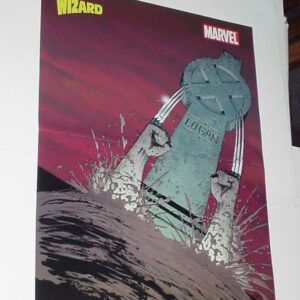
Wolverine Poster #13 Lives! by John Cassaday X-Men
$34.99 Add to cart -

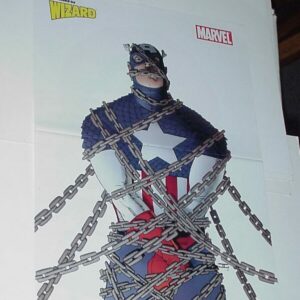
Captain America Poster # 9 In Chains by John Cassaday Issue 8
$29.99 Add to cart -
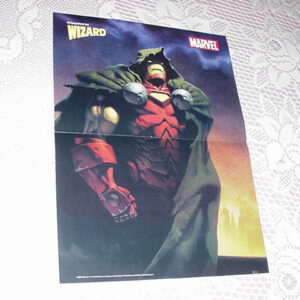
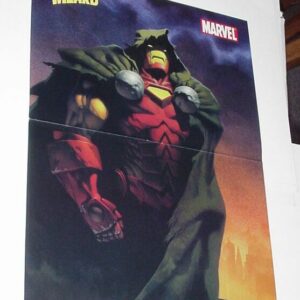
Iron Man Poster # 5 by Kev Walker Iron Doom Exiles 23 Cover
$29.99 Add to cart -


Elektra Poster # 2 by Rodolfo Migliari Daredevil Thunderbolts
$29.99 Add to cart

